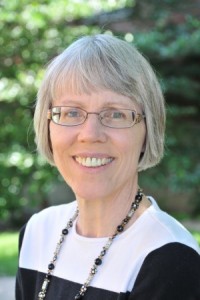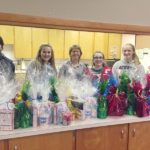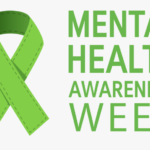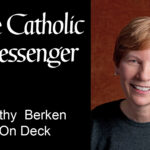By Barb Arland-Fye
The Catholic Messenger
At age 35, Martin Hellman made a change in his relationship with his wife of 14 years because he wanted their marriage to survive and thrive.
“I got curious, not furious,” the retired Stanford University professor told me after a talk we both attended Nov. 21 at Drake University in Des Moines on the urgent need to reduce the risk of nuclear war.

Hellman said he thought his wife came up with the craziest ideas, which frustrated him because he couldn’t figure out what she had in mind or why. “Now I say, ‘What you’re doing sounds crazy. What am I missing?’ She explains her ideas and oftentimes they are brilliant, Hellman says, which is why “we have to ask more questions.”
He used that story to illustrate the importance of communication and relationship building, personally and globally. Hellman chose to make changes in his life for peace within the family; the same principle applies to a nation and a world fraught with tension. We need to make changes in our relationships at the global level to eliminate the risk of nuclear war.
A special report that Hellman wrote for the Federation of American Scientists, “Rethinking National Security” (April 2019), does an excellent job of demonstrating how “our national security is increasingly dependent on all nations feeling more secure, including those we regard as adversaries.”
You can read this reader-friendly, eight-page report at https://tinyurl.com/yd2fvlhw. Hellman raises many questions to reflect on regarding our understanding of peaceful coexistence and the role of nuclear weapons in deterrence of world war.
Hellman concludes his paper with two questions: “In the age of nuclear weapons, cyberattacks, terrorism, and environmental crises, is national security becoming inseparable from global security? If so, how do our current policies need to change?”
I met Hellman just a few days before Pope Francis visited the cities of Hiroshima and Nagasaki in Japan, which suffered the first and only use of nuclear weapons in war. He visited the Atomic Hypocenter Park near the ruins of Nagasaki’s Catholic Cathedral, which the atomic bomb destroyed. The ruins, he said, are reminders of “the unspeakable horror suffered in the flesh by the victims of the bombing and their families” (Catholic News Service, Nov. 24).
A question the Holy Father asked in Nagasaki reminded me that the nuclear deterrence issue begins in our hearts: “How can we speak about peace even as we justify illegitimate actions by speeches filled with discrimination and hate?”
I thought about a conversation the day before with a close relative. He received a political questionnaire in the mail that upset him because of the assumptions made in the questions. He fired off a response which included disparaging comments. Like him, on occasion I have the urge to give into temptation that feeds polarization. I try to let go of that impulse by calling to mind the memory of my Grandma Irene Arland, who lived the Catholic faith she believed in.
I think she would agree with Martin Hellman’s creed: Get curious, not furious. That is how we build communication, relationships and lasting peace. It could be a phrase to reflect on this Advent season as we prepare to welcome the Prince of Peace.
(Contact Editor Barb Arland-Fye at arland-fye@davenportdiocese.org)











